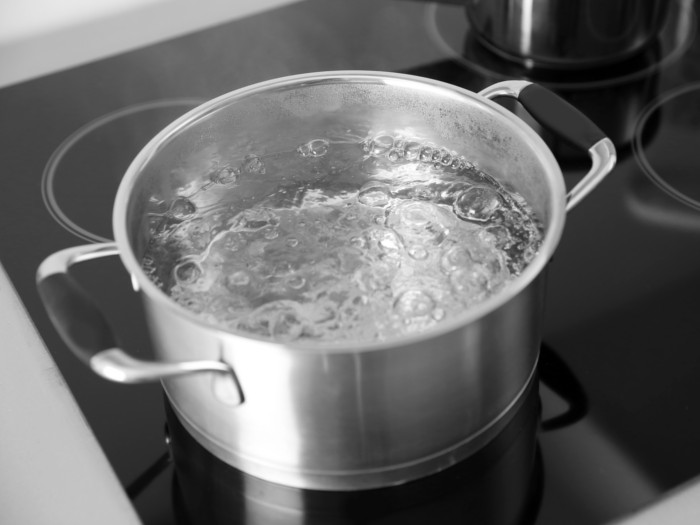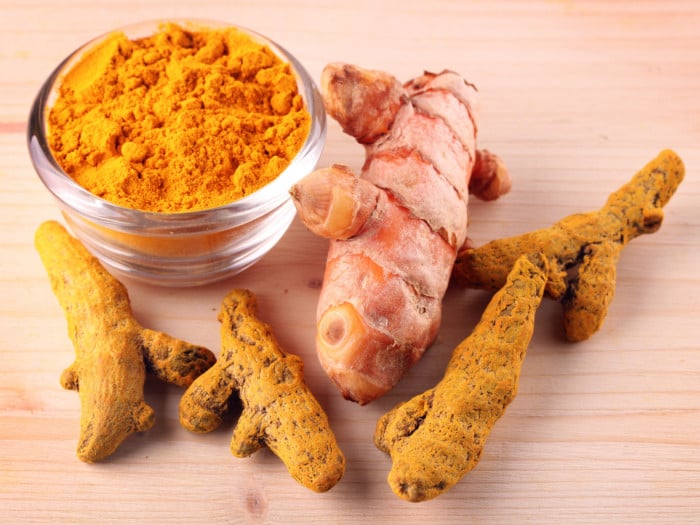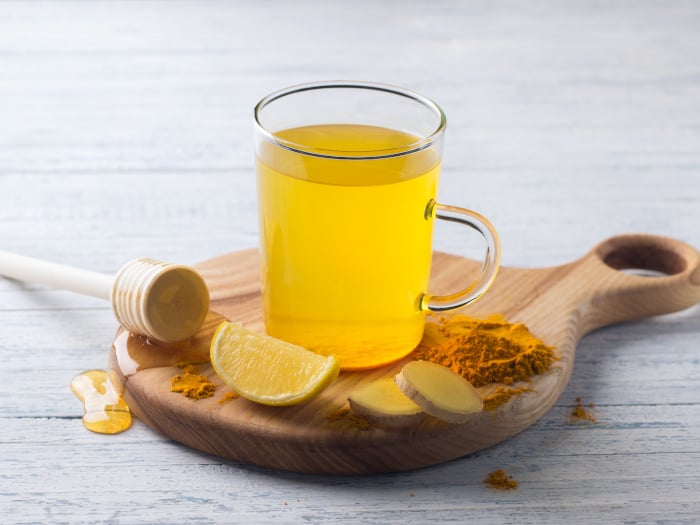Turmeric as a spice may have been used in Asian countries such as India for various culinary preparations. However, due to the ongoing research on curcumin, rich turmeric has found its place in households all over the world. Drinking turmeric tea is the easiest way to add this healthy spice to your daily routine.
The impressive benefits of turmeric ginger tea may include eliminating inflammation, strengthening the immune system, improving digestion, soothing pain, and enhancing cognition. It also aids in protecting the heart, regulating diabetes, and improving skin quality.
What is Turmeric Ginger Tea?
Turmeric ginger tea is made by steeping ginger root and fresh turmeric root in hot water. Ginger (Zingiber officinale) and turmeric (Curcuma longa) are widely used individually for their nutritional and medicinal effects. These two powerful herbs are also widely available and have been heavily researched due to their global popularity.
Nutritional Value of Turmeric Ginger Tea
Turmeric ginger tea is a delicious and healthy low-calorie and caffeine-free drink. The beverage derives its medicinal benefits from:
- Turmeric: Fresh turmeric root contains bioactive compounds called curcumin, which have powerful anti-inflammatory and antioxidant properties. If you cannot find turmeric root, organic turmeric powder is a great substitute. [1]
- Ginger: Gingerol, in ginger root, may have anti-nausea, anti-inflammatory, and anti-carcinogenic properties. [2]
- Lemon juice: The juice of lemon has high levels of vitamin C, an antioxidant that boosts immunity levels and enhances the skin. [3] [4]
- Honey: Honey has high levels of antioxidants that can help lower high blood pressure and improve cholesterol. [5]
- Black pepper: A pinch of black pepper is all that is needed to unclog sinuses and keep the digestive system in order. [6]
Turmeric Ginger Tea Benefits
Let’s look at the benefits of turmeric ginger tea in detail.
May Reduce inflammation
Ginger and turmeric are two spices commonly used in traditional medicine for their potential anti-inflammatory properties. These anti-inflammatory properties may help reduce oxidative stress in the body, which is an imbalance between the production of free radicals and the body’s ability to neutralize them. Oxidative stress has been linked to various diseases, including neurodegenerative disorders. [7]
A study involving 120 people with osteoarthritis published in the Journal of Traditional and Complementary Medicine showed that consuming 1 gram of ginger extract per day for 3 consecutive months effectively lowered inflammation and levels of nitric oxide, which causes inflammation and chronic diseases. Meanwhile, a review published in the Journal of Alternative and Complementary Medicine has shown that turmeric extract can help to reduce inflammation, in the same way as certain anti-inflammatory medicines like ibuprofen and aspirin. [8] [9] [10]
Pain Management Support
Multiple studies collectively highlight the potential analgesic properties of ginger and turmeric-derived compounds in alleviating various types of pain, including muscle pain, dysmenorrhea, osteoarthritis, and pathological pain conditions. [11] [12] [13] [14]
In a 2015 report published in the Nutrition Journal by a collaborative team of researchers from the UK and the US, it was revealed that the Zingiberaceae extracts present in this tea demonstrate analgesic properties, providing effective relief from pain throughout the body. [15]
May Protect Heart Health
A 2019 animal study published in the Evidence-based Complementary and Alternative Medicine Journal has found Zingiberaceae extracts (present in both ginger and turmeric), may have the power to lower cholesterol levels, primarily LDL cholesterol. [16]
This is of significant importance as LDL cholesterol is a major contributor to the formation of plaque in arteries and blood vessels, a process that can elevate the risk of atherosclerosis. The study provides valuable insights into the potential cardiovascular advantages associated with the consumption of Zingiberaceae-rich substances like ginger and turmeric.
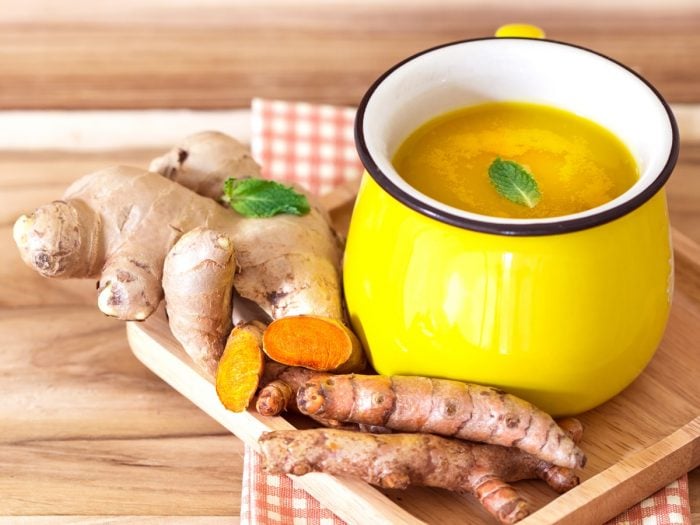
A healing cup of tea Photo Credit: Shutterstock
May Improve Brain Health
While the brain-boosting nature of ginger is well known, the unique combination of antioxidants present in turmeric can help stimulate neural activity and increase focus. This is confirmed in a study by a team of American researchers.
Ginger also offers anti-inflammatory effects on brain tissue, which can reduce oxidative stress. An animal study published in the Evidence-based Complementary and Alternative Medicine showed how when diabetic rats were administered with ginger extracts, it exhibited neuroprotective effects against any oxidative damage including potential brain damage. [17]
Another research study highlighted ginger’s potential role as a cognitive enhancer, particularly beneficial for middle-aged women, given that participants demonstrated improved working memory during the investigation. [18]
May Boost Immunity
Turmeric ginger tea boasts antimicrobial, antibacterial, anti-fungal, and antiseptic qualities that can make it an excellent immune system aid, according to a study conducted by a team of Indian researchers. [19]
Multiple studies suggest that curcumin, found in turmeric, and ginger exhibits significant immune-modulating and antiviral properties. Curcumin demonstrated efficacy against influenza A virus (IAV) by inhibiting viral replication, reducing inflammation, and activating host defense mechanisms. [20]
Ginger, on the other hand, displayed antibacterial activity against respiratory pathogens and antiviral activity against the human respiratory syncytial virus (HRSV). The combined findings underscore the potential of turmeric and ginger compounds in bolstering the immune system and combating viral infections. [21]
May Aid in Skin Care
The turmeric in this herbal tea has often been used to treat skin conditions, particularly acne and inflammatory problems like psoriasis and eczema. The gingerol within turmeric ginger tea is also an excellent antibacterial and antioxidant compound that can protect the skin from infection, while it may also stimulate the growth of new cells and prevent signs of aging, such as wrinkles and blemishes. [22]
May Aid Digestion
Ginger possesses possibly strong anti-inflammatory properties that can help settle the stomach, reduce nausea, and promote healthy digestion. It can help stimulate peristaltic motion and may eliminate cramping and bloating, which can also eliminate the symptoms of constipation. Turmeric ginger tea can also help in treating Irritable Bowel Syndrome (IBS), ulcerative colitis, acid reflux disease, and even stomach ulcers! [23] [24]
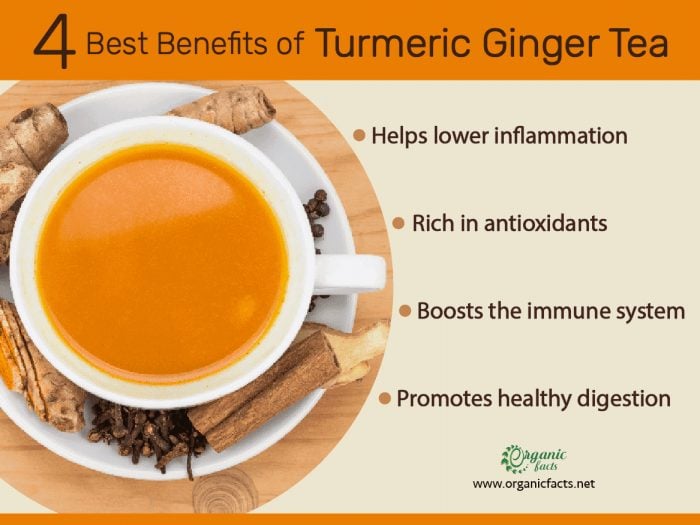
Turmeric ginger tea is made by steeping ginger root and fresh turmeric root in hot water.
May Manage Diabetes
Animal research published in the British Journal of Nutrition shows the blood sugar-regulating abilities of both ginger and turmeric are well known, so in combination, they may be even more effective for managing symptoms of diabetes. By keeping glucose and insulin levels balanced, turmeric ginger tea can prevent the dangerous spikes and drops in blood sugar that can be disastrous for those with diabetes or those at high risk of developing the disease. [25]
How to make Turmeric Ginger Tea?
Turmeric ginger tea can be brewed at home easily and all you need is fresh ginger, turmeric, lemon, honey, and black pepper. So here’s how you can make Turmeric Ginger Tea at home.
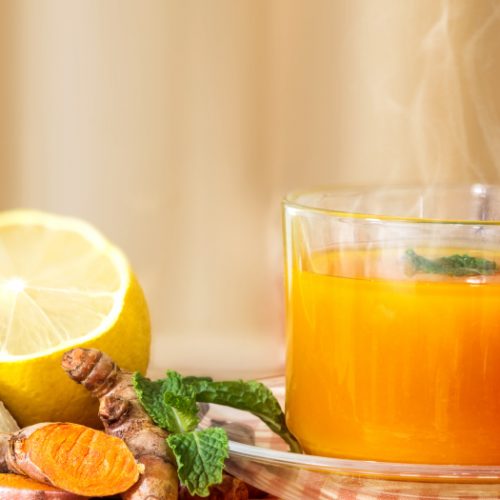
Turmeric Ginger Tea Recipe
Ingredients
- 1 cup water filtered
- 1 tsp grated ginger
- 1-2 tsp grated turmeric root/turmeric powder
- 1 tsp honey/lemon juice
- 1 tsp black pepper
Instructions
- To make turmeric ginger tea, first, bring the water to a boil in a saucepan or stainless steel pot.

- Before you get started, you would want a fresh ginger root, which can be grated for preparing tea. Similarly, turmeric is also a root in its fresh form and should be grated in preparation for brewing this tea.

- Add the turmeric and ginger, and then bring the heat down to a simmer.
- Allow the mixture to steep for 10-15 minutes. You can steep the mixture for a lesser duration if you do not wish to make it too strong.
- Strain the tea into a teapot. Add the black pepper, lemon juice, and honey, and enjoy the beverage!

Notes
How often can you drink Turmeric Ginger Tea?
There is no standard dosage or exact measurement of how much turmeric ginger tea can you drink a day. Turmeric ginger tea is extremely powerful, so when taken in moderation you will be able to enjoy the health benefits outlined above. It is best to consume 1-2 cups every day. [26]
To make turmeric ginger tea, you can use ginger root extract which is available in supplement form as well. It is effective when taken in doses between 1,500–2,000 mg daily. Turmeric supplements are available as well and they provide a more concentrated dose of curcumin. It can be taken in doses of 1000 mg daily. Consuming more than this can increase the risk of certain side effects. It is advisable to consult a doctor before consuming it. [27] [28]
Side Effects of Turmeric Ginger Tea
The side effects of turmeric ginger tea largely result from excess consumption and include gastrointestinal problems. Also, they can occur as a result of drug interactions, complications with pregnancy, individual allergies, and excessive consumption of the tea, which is not recommended.
- Drug interactions: If you are taking any medication for managing diabetes or high blood pressure, the glucose-regulating and hypotensive nature of turmeric ginger tea may drop your blood sugar or blood pressure to dangerous levels, says a 2015 study published in the Iranian Journal of Pharmaceutical Research. Ginger has been shown to have anti-diabetic properties which could interfere with the medications and bring down the sugar levels further. It is thus advisable to speak with your doctor before adding this tea to your health regimen. Also, this tea has anticoagulant properties, so it may interfere with warfarin or blood-thinning medications. [29] [30]
- Allergic reactions: Allergies to ginger and turmeric do exist, and may result in skin irritation, headache, nausea, dizziness, swelling of the tongue, lips, or throat, and other common allergic reactions. [31]
- Pregnancy: Most experts argue that potent medicinal effects can be dangerous to breastfeeding and pregnant women, so this herbal combination should be avoided. A 2010 study involving mice showed that curcumin could lower the implantation rate and the fetal weight in the embryo. This means that there is a possibility that curcumin is likely to prompt cell death and cause impairment of embryonic development. However, this study is not based on humans and hence researchers cannot ascertain if curcumin will produce the same results in pregnant women. [32]
- Gastrointestinal distress: When turmeric ginger tea is consumed in excessive amounts, it can cause stomach upset, bloating, and cramping. [33]
